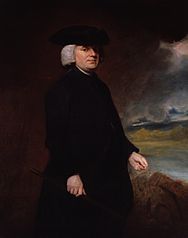
William Paley (1743 - 1805)
"Natural Theology, or Evidences of the Existence and Attributes of the Deity" (1803)
Paley was an advocate of Natural
Theology, the idea that the nature of the deity could be
inferred from study of his creations. He refined the classic "Argument
from Design" and the "Watchmaker Analogy"
in such a way that the young Charles Darwin was convinced of its
truth:
"In crossing a heath,
suppose I pitched my foot against a stone, and were asked how
the stone came to be there; I might possibly answer, that, for
anything I knew to the contrary, it had lain there forever:
nor would it perhaps be very easy to show the absurdity of
this answer. But suppose I had found a watch upon the ground,
and it should be inquired how the watch happened to be in that
place; I should hardly think of the answer I had before given,
that for anything I knew, the watch might have always been
there. ... There must have existed, at some time, and at some
place or other, an artificer or artificers, who formed [the
watch] for the purpose which we find it actually to answer;
who comprehended its construction, and designed its use. ...
Every indication of contrivance, every manifestation of
design, which existed in the watch, exists in the works of
nature; with the difference, on the side of nature, of being
greater or more, and that in a degree which exceeds all
computation."
Paley went on to offer multiple extensions to this argument, as well as examples of design from new discoveries in biology.
The analogy has been criticized from several perspectives. Charles Darwin in his autobiography wrote,
"Although I did not think much about the existence of a personal God until a considerably later period of my life, I will here give the vague conclusions to which I have been driven. The old argument of design in nature, as given by Paley, which formerly seemed to me so conclusive, fails, now that the law of natural selection has been discovered. We can no longer argue that, for instance, the beautiful hinge of a bivalve shell must have been made by an intelligent being, like the hinge of a door by man. There seems to be no more design in the variability of organic beings and in the action of natural selection, than in the course which the wind blows. Everything in nature is the result of fixed laws." [emphasis added]
David Hume (1746 - 1776) had previously argued in his "Essay on Human Understanding" and his posthumous "Dialogues Concerning Natural Religion" against the Argument from Design.
Paley went on to offer multiple extensions to this argument, as well as examples of design from new discoveries in biology.
The analogy has been criticized from several perspectives. Charles Darwin in his autobiography wrote,
"Although I did not think much about the existence of a personal God until a considerably later period of my life, I will here give the vague conclusions to which I have been driven. The old argument of design in nature, as given by Paley, which formerly seemed to me so conclusive, fails, now that the law of natural selection has been discovered. We can no longer argue that, for instance, the beautiful hinge of a bivalve shell must have been made by an intelligent being, like the hinge of a door by man. There seems to be no more design in the variability of organic beings and in the action of natural selection, than in the course which the wind blows. Everything in nature is the result of fixed laws." [emphasis added]
David Hume (1746 - 1776) had previously argued in his "Essay on Human Understanding" and his posthumous "Dialogues Concerning Natural Religion" against the Argument from Design.
- He argued against the induction that the
construction of the Universe, about which we knew nothing,
was necessarily analogous to the construction of a watch,
about which we knew a great deal.
- He argued the false equivalence of the Universe
and a Watch, noting that although they might be alike in
some ways, they were not alike in all ways. For example a
Lion and a Kitten are both Cats, but though a Lion roars, a
Kitten does not. (Note that a cheetah is a cat, but unlike
all other cats does not have retractable claws).
- Further, unlike a mechanical watch, the Earth was
largely organic, and more like a vegetable,
which by observation required neither a designer nor a
builder.
- Finally, supposing that the Universe did indeed show evidence of design, it did not follow that the Designer was the benevolent, personal God of Christianity. He noted that mechanical contrivances (such as ships) were typically the work of many people, not necessarily highly skilled, often developed and (or) built by trial and error, and with successive improvements to design in successive creations. The Dialogues present a conversation between three friends: the antagonist suggests that, for all we know, our own Universe is only one of many, and may be the first or last efforts of a immature or senile God, and in its imperfections the subject of ridicule by other Gods.